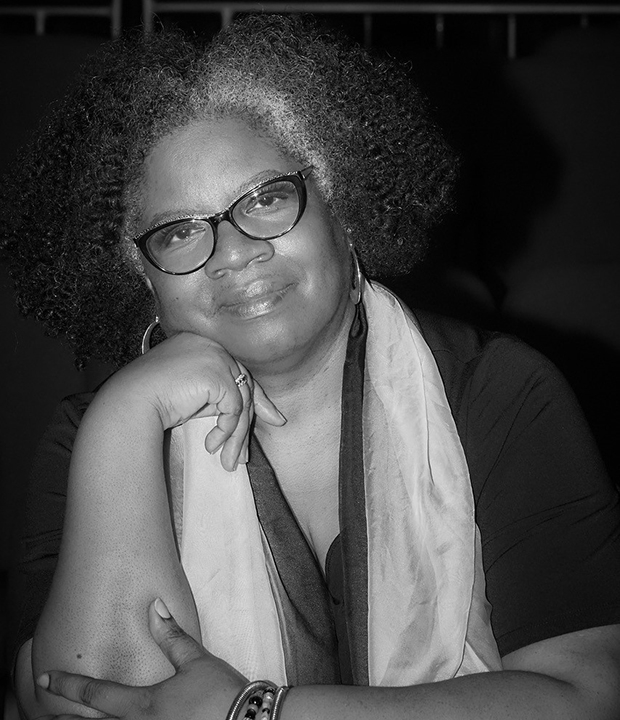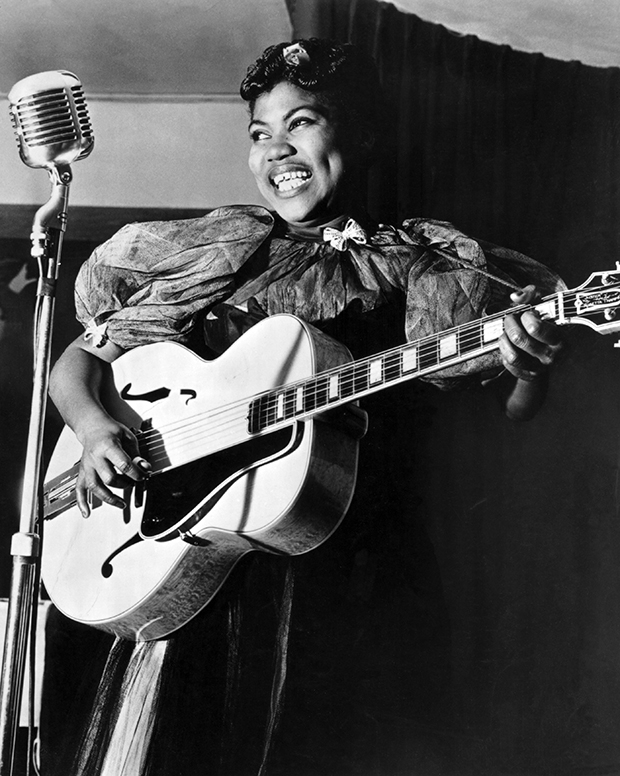Interview: Playwright Cheryl L. West on the Legacies of Fannie Lou Hamer and Sister Rosetta Tharpe
In two stage works, West explores the complex lives of these important figures from history.
Playwright Cheryl L. West doesn't see herself as a pioneer of pandemic performance, but in a way, one of her stage works has become a model of how to do theater safely outdoors. Fannie Lou Hamer: Speak On It, a show about the titular activist and the importance of voting, was performed in public parks in the months leading up to the 2020 presidential election, presented by the Goodman Theatre in Chicago. That same staging moved to Washington, DC, under the auspices of Arena Stage, and a different mounting was presented by Premiere Stages at Kean University in New Jersey.
Hamer's story of activism was perfect for the time, and, like another famous figure from history West is writing about, rock-and-roll pioneer Sister Rosetta Tharpe, teaches us a lot about the world we live in today. Here, West discusses the impact of these two unique women and the productions she's creating to center their stories.

(© Abe Booker)
Your piece Fannie Lou Hamer: Speak On It is one of the few actual in-person theater productions that took place during the pandemic. Tell me about it.
I was working a piece about the '60s for the Fifth Avenue Theatre, and I came across the story of Fannie Lou Hamer and I remember thinking it would make a wonderful one-woman show. That other project did not come to fruition, so I decided to do Fannie Lou Hamer. I'm always interested in stories that have to do with resilience and courage and perseverance, and her story had all of that and more. I happened to meet Tanya Palmer from the Goodman at a summit on parity and women in theater, and I went up to her and I was like, "Listen, I have this show that I think will be really great in Chicago." She went back and they decided to commission it, and then I went to Seattle Rep, which is my home theater, and they co-commissioned it.
Henry Godinez is the director, and when the pandemic hit, we were supposed to be going into rehearsal. He thought, because the timing was before the election, let's take this piece to the community. We couldn't take the entire piece, so I wrote an abridged version that could be done in parks. It was one of the first, if not the first, production that was actually sanctioned by the unions. The Goodman, to their credit, worked very hard to make it happen with the city of Chicago. It was a lot of coordination to come up with protocols that were going to keep everybody safe, while getting it out to the community.
The piece called Speak On It is very much aimed at voting, and getting people exciting about voting and why it's necessary. The entire piece, which we're calling Fannie: The Music and Life of Fannie Lou Hamer, is more about her entire life, and how her life was an example of community engagement and activism.
What does it mean to you to know that you sort of pioneered the way theater can be done outdoors during the pandemic? Did you think about that aspect of it?
I'm not sure. Henry was really at the head of thinking about that. I'm so grateful that I had this team of E. Faye Butler and Felton Offard, who's our music director and did the arrangements, that I had the Goodman and Seattle Rep, and that the Goodman board made it happen. And people showed up in the parks so excited. They would be bundled up and masked just to have some live theater, especially theater that was saying something about the times we were living. At one performance, E. Faye offered a prayer for Justice Ginsberg, who died right during the show. We met people that had known Fannie Lou Hamer and had a story to tell us.
We call the show "the Fannie that could" because it just keeps going. There are going to be a few more productions of the entire show and we're very excited about that. First of all, her life was such an example of how you get up in hard times and you keep on keeping on. That's what we are living through right now. We are feeling challenged. Some of us are feeling helpless. Some of us are feeling hopeless. But Fannie Lou Hamer never allowed herself to languish in those kinds of places. She said, you know what? You can pray, but you got to get up off your knees at some point and do something. It has to translate into action.

(© Michael Ochs Archives/Getty Images)
How did Shout Sister Shout come to be?
The book that inspired me came out probably over 10 years ago. Rosetta's music was so wonderful and joyous and rapturous. She was a prodigy at 4 years old. She was playing the guitar and she was so small they would put her on top of the piano so people could see her. She had so much charisma, and she mixed spiritual and secular at a time when you never did that and paid a big, heavy price for it. Her belief in the power of music cost her her popularity and music and soul, and I don't know if she ever totally reconciled that for herself.
Like Fannie Lou Hamer, when I read the book, I thought it would be a great story for the stage, because here's this woman, who, even when she lost her leg, still said, "I will bounce on my behind if I have to, but I will still praise the Lord." I thought, "My goodness, I want to know what she's eating!" [laughs] I tried to get a couple of theaters interested then and no one was, but then it came back around. Randy Johnson got the rights and asked me to work on it, and sometimes things don't come on your time, they come in the right time. We did it in Pasadena and I knew it wasn't right. We did a page-one restructuring in Seattle and it did very well, and I'm still working on it. We have a new orchestrator, Joseph Joubert and he is a musical genius. Hearing his ideas has helped me in some of the things I've reshaped. We're hoping to have another regional production to see what we have and then come into New York [to Broadway]. I'm not sure when that will happen, but for the first time, it feels more imminent.
I feel like there's a similar through line in the stories of Fannie Lou Hamer and Sister Rosetta Tharpe.
Yes. I'm so interested in what these iconic people have to teach us, and these women were such pioneers and trailblazers. As artists, we're always second-guessing about how to keep going when the money is running out. You're worried about failure. I have two children — they're grown now, but there are always times where you will have been shocked to the point of thinking, "Can I keep going?" So you study these women and men from history, you see the obstacles they had to face, and sometimes you pale in comparison, but that gives you a sort of road map for how to keep going yourself. Each of these women also had joy, even through the difficult times.







